#delhi a soliloquy
Photo

(via Delhi Gadhakal (Delhi: A Soliloquy) by M Mukundan)
Delhi Gadhakal (Delhi: A Soliloquy in English Tanslation) by M Mukundan vividly portrays the lives of ordinary individuals in Delhi grappling with the turmoil of Indo-Pak and Indo-China wars and their aftermath, the Emergency, and the harrowing anti-Sikh riots. The novel progresses through the tales of several protagonists, particularly Malayalis who have called Delhi their home from the early 1960s to the present day.
The work is significant in that it records, using the tools of fiction, a specific era in the history of a particular region. However, a major disappointment for me personally was that the narration was purely linear following a traditional storytelling style and hardly us...
(Read full text on booksperience.org)
#books#reading#1960s#delhi#delhi a soliloquy#delhi gadhakal#emergency#fiction#indo china war#indo pak war#kerala#m mukundan#malayalam#malayalam literature#malayalam novel#new delhi#novel#period novel#realism#realistic writing#sikh riots#booksperience
0 notes
Note
fuck everything give me some books youd like to read in 2024 (havent talked about books in one hour and going insane)
you're such a nerd lessgo 😻 okay so my releases I'm super hyped for + my priority tbr at the moment
the great indian novel
this is how you lose the time war
we unleash the merciless storm
rumours of spring: a girlhood in kashmir
beautiful broken things
delhi; a soliloquy
how to kill your family
wild and wicked things
a wish in the dark
everybody loves a good drought
the perfect guy doesn't exist
four eids and a funeral
where sleeping girls lie
just another epic love poem
dear wendy (holy shit i can't believe it's out in a couple months i remember when it felt too far away to even abstract GOD I'm emo now)
and they were roommates
this is me trying
rani chaudhari must die
happy endings
hostile homelands
he who drowned the world
almost home
summer's edge
everyone wants to know
maybeeeee give the oleander sword another shot? we'll see
12 notes
·
View notes
Text
Best historical novels for all time in Marathi
History is best topic to read and to understand also. Benefits of reading of reading such type of books is we can improve our behavior from mistakes that can harmful to us. Also, it helps to understand why the present rules or world are like this? (history tell us the reasons behind that) with that it gives the chance to understand our real hero’s and legends, sacrifices done for peace.
So, Here are the 5 historical books suggestion that can help you to improve yourself.
Mrutyunjaya by Shivaji Sawant
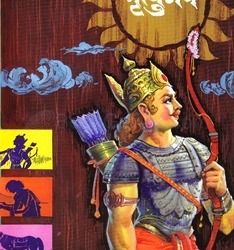
Mrutyunjaya is the autobiography of Karna, and yet it is not just that. With deceptive case, Sawant brings into play an exceptional stylistic innovation by combining six "dramatic soliloquies" to form the nine books of this novel of epic dimensions. Four books are spoken by Karna. These are interspersed with a book each from the lips of his unwed mother Kunti, Duryodhana (who considers Karna his mainstay), Shon (Shatruntapa, his foster-brother, who here-worships him), his wife Vrishali to whom he is like a god and, last of all, Krishna. Sawant depicts an uncanny similarity between Krishna and Karna and hints at a mystic link between them, investing his protagonist with a more than-human aura to offset the un-heroic and even unmanly acts which mar this tremendously complex and utterly fascinating creating of Vyasa.
Shriman yogi by Ranjit desai
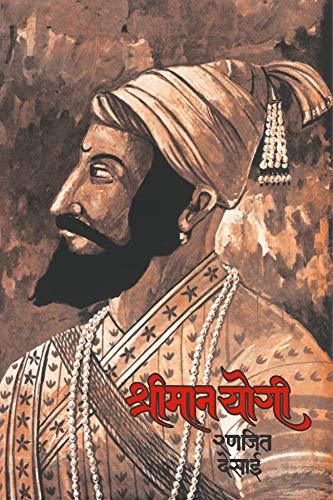
This is a biographical novel on Shivaji Maharaj. This historical novel has created history in the world of literature and books. Shivaji Maharaj is the most worshipped person in Maharashtra. Every single household here knows Shivaji Maharaj. He is the most respected character. He was a dream come true. Shivaji Maharaj was born as a Hindu but at such time when Hinduism was forgotten by the Hindus. In his novel Ranjit Desai pictures Shivaji from his birth rather he starts with the days prior to his birth. Before writing this novel Desai has searched history, he has not left any stone unturned while doing so. Writing on Shivaji Maharaj was a very difficult task. Shivaji Maharaj had many qualities and the last 34 centuries have changed people`s view about him. They have become more possessive about him adding unnecessarily, and untruthfully to his qualities considering him a god. On this background it was very difficult to portray Shivaji Maharaj as perfect as possible Desai had realised his responsibility. He has pictured Shivaji Maharaj meticulously in this novel. Religious but not superstitious, strict but not wicked, adventurous but not impetuous, practical but not aimless, realistic, visionary but not dreamy. Graceful but not prodigal. Desai has succeeded in highlighting Shivaji Maharaj human nature. His base was that of a human. He valued all, respected every religion. He was an expert commander. He awakened the love for motherland in the sleeping mind, of people. He ignited their confidence. While describing this, Desai has brought many of Shivaji Maharaj qualities into limelight. Shivaji Maharaj was a noble king but he was a nobleman. He also had his own sufferings. He lost many, but his first preference was his motherland. As we go on reading, we get involved in the book so much that we live each moment and when Desai ends the novel, we feel that “WE” have lost Shivaji Maharaj.
Shaymchi aai by sane guruji
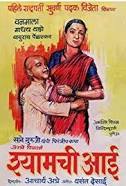
Shyamchi Aai (Marathi: श्यामची आई; English: Shyam's Mother) is hailed as one of the greatest tributes to mother's love in Marathi literature. It was written by famous author and social activist Sane Guruji. this book is representing the love between mother and her child.
Shyamchi Aai is an autobiography of Sane Guruji belonging to a Brahmin family in Konkan region of rural Maharashtra during British Raj. Sane Guruji, fondly called Shyam during his childhood, is narrating his memories to a group of children in a nightly sitting.
Chapters in the book are named ratra meaning "night" in Marathi. They are named first night, second night and so on. Every passing 5, the story takes you into the family setting in rural Konkan and its beautiful seaside landscapes with adjoining ranges of Sahyadri.
As the title suggests the central character is Shyam's mother and the kind of enormous influence she has on Shyam's life and upbringing. It involves sticking to one's ideals even though one is neck deep in abject poverty.
The narration is flamboyant and involves readers in the setting smoothly. As the story progresses, we come to know the deterioration of Shyam's debt-ridden family. The communication between father and son, mother and son, and siblings is exemplary. It shows that if love is present in a person's life, the person can be content; no matter how poor he is.
The book starts with Shyam's mother getting married into a wealthy family, its slow progression into debt-ridden poverty, and ends with illness and death of his mother.
Pavankhind by Ranjit desai

Maharashtra, the state in Western India, had been under the rule of the Muslims since the thirteenth century. For about four hundred years it had tyrannical and intolerant kings from outside who never allowed the local population to live in peace. Loot, exploitation in the name of religion, rape and violence were rampant until Chhatrapati Shivaji Maharaj challenged the rulers and set up a Maratha empire in the seventeenth century. His mission was not a cakewalk: he had enemies from within, outside the state as well as those from other countries (the Portuguese and the British had made their present felt by then.) Loyalty of his followers was one major factor that helped Chhatrapati Shivaji Maharaj build an empire which was held in awe. Pavankhind is a historical novel that covers the events leading to the War of Pavankhind. (Pavankhind is a pass near Kolhapur.) The king successfully made his way through a siege of the pass; thanks to Baji Prabhu Deshpande who made the break through possible. Ranjit Desai (1928-1992) tackled the genre of novels with such ease that his collection includes all types of novels: historical, social, mythological, and biographical. He was also a playwright and has to his credit short stories.
Panipat by vishwas patil
The third battle of Panipat was fought over the throne of Delhi between the Marathas and the king of Afghanistan, Ahmad Shah Abdali. While the face-off had stretched for months, the actual conflict took place on 14 January 1761. And within a span of twelve hours, 150,000 soldiers lost their lives. About 80,000 horses, bullocks and elephants were slaughtered too. And even though the Marathas fought like absolute heroes, the battle ended up bringing their empire to its knees, emptying out its coffers and decimating an entire generation of youth. Panipat has received thirty-eight awards since its release in 1988, and sold more than 200,000 copies. Published in English for the first time, this translation is going to be an absolute treat for connoisseurs of historical fiction.

3 notes
·
View notes
Text
Delhi: A Soliloquy
Delhi: A Soliloquy by M. Mukundan is A Portrait of India's Capital constructed through the Stories of its Inhabitants
Delhi: A Soliloquy by M. Mukundan is A Portrait of India’s Capital constructed through the Stories of its Inhabitants
A city is not just its roads and buildings. It is also shaped by the people who call it ‘Home’. The city is like a giant cauldron of emotions – holding together their many joys, sorrows, tears, laughter, rage and pain, success , disappointments. For Delhi, the seat of political…

View On WordPress
0 notes
Text
Delhi: A Soliloquy ( English, Paperback, M. Mukundan)
Delhi: A Soliloquy ( English, Paperback, M. Mukundan)
This book published by Eka.

View On WordPress
0 notes
Text
Review: Delhi - A Soliloquy by M Mukundan
Review: Delhi – A Soliloquy by M Mukundan
537pp, Rs799; Westland
“Fear will soon be the only emotion left” says a character in M Mukundan’s Delhi – A Soliloquy. This sentiment feels rather prescient for our time. Originally published in Malayalam as Delhi Gadhakal in 2011, there are several factors which render the novel contemporary – its references to war, Emergency, death is conversant with the overwhelming gloom and uncertainty…
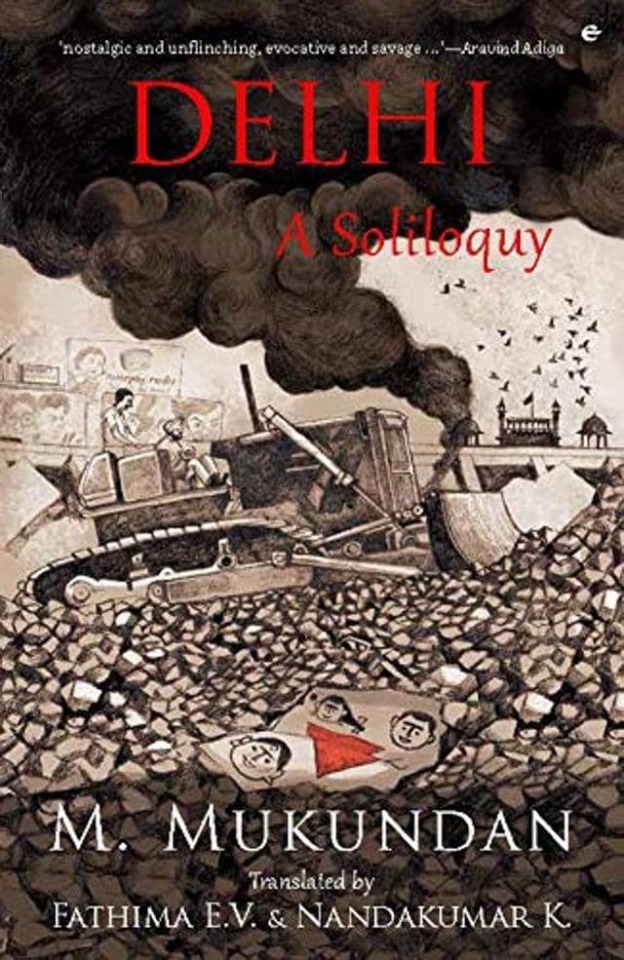
View On WordPress
0 notes
Text
Filter coffee ☕️ & 📚 Shashi Kapoor-the householder, the star
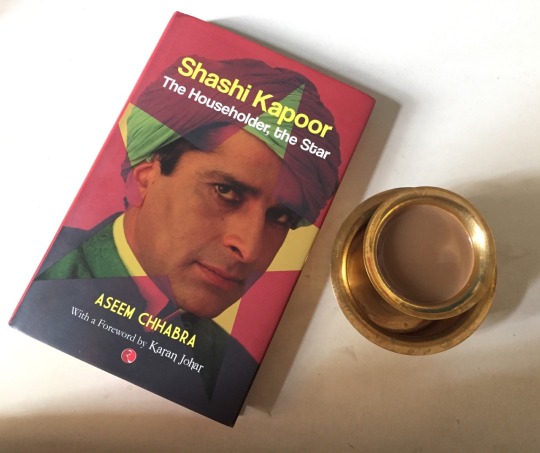
As a big fan of #sashikapoor, I was thrilled when my son gifted me this 📖 when the 💫 passed away.
I’ve seen most of Shashi Kapoor’s films, some of them several times. Who can forget his lighthearted essaying of his roles in Sharmilee, Pyar Ka Mausam, Aa Gale Lag Jaa or Chor Machaye Shor. Then there was the brilliance of the actor in Householder, Shakespeare Wallah, Heat and Dust, Siddhartha, Junoon and New Delhi Times, just to name a few of his films which made an impression on me.
And not to forget, all those numerous movies, where he paired with Amitabh Bachchan and was an admirable foil to Bachchan’s angry man role - encapsulated by his famous one-liner repartee in #Deewar of ‘Mere pass Ma hai,’ to Amitabh’s powerful soliloquy.
#AseemChhabra’s biography of Shashi Kapoor, beams a spotlight on what went on behind the scenes during the production of many of these films and Shashi’s own productions and while doing so, gives the 👩🏫 a rare glimpse into the artiste’s mind and what he brought to each role.
Through wide ranging, insightful interviews with people close to Shashi Kapoor, Chhabra relates several unknown and delectable little anecdotes about the 🌟, the actor, the producer, the friend and family man. He discusses in depth the actor’s popularity as, perhaps, the first international star from India and the range of films he made for an international audience - from the handsome young Shashi of Householder to the world weary and ageing Kapoor in Side Streets.
James Ivory, in whose Merchant-Ivory production house, he made many memorable films, says of Shashi, ‘the reason a star is a star is because he or she has something extra-an extra gift or grace or charm and beauty. And Shashi has all of this.’
What is most interesting of the biography is that Chhabra does not have a single tete-a-tete with the man himself and although I wistfully turned the pages hoping to read what Shashi Kapoor had to say of himself, Chhabra never lets you miss this, as he leads you on a poignant journey into the heart and mind of the star, the householder. I give it 4/5 🤩
🌟🌟🌟🌟
0 notes
Video
If you've ever seen the 1976 movie Network, you'll know the unforgettable scene in which TV news anchor Howard Beale (played by Peter Finch) ignoring the teleprompter, breaks into one of the greatest soliloquies, a wandering but coherent rant about the banks, crime and unemployment. Finally, he urges his viewers to throw open their windows and yell, "I'm as mad as hell and I'm not going to take this any more!" Today, Network feels as fresh and vital as it did 36 years ago, and not just because Finch, Faye Dunaway and Beatrice Straight won Oscars for acting in it. It's because the movie predicts everything about modern media in the 21st Century—from reality TV and YouTube to Glenn Beck and the tabloid news format. And it did so 20 years before the internet even existed. It's spooky how much the movie got right about the direction of the news business specifically, and the media generally. (businessinsider.com/spooky-the-1976-movie-network-predicted-youtube-and-two-and-a-half-men-2012) . . . . . . . . #network1976 #network #howardbeale #peterfinch #1976 #1970s #70s #moviebuff #media #news #truth #fact #movie #movieclip #predictions #anarchism #television #india #india_igers #india_gram #india_ig #india_91 #indiagram #delhi #mumbai #bangalore #chennai #kolkata #delhigram #followme
#india_ig#india#1970s#chennai#network#mumbai#media#predictions#network1976#kolkata#indiagram#delhigram#delhi#moviebuff#india_igers#70s#howardbeale#news#bangalore#india_gram#movieclip#television#anarchism#india_91#1976#followme#truth#movie#peterfinch#fact
1 note
·
View note